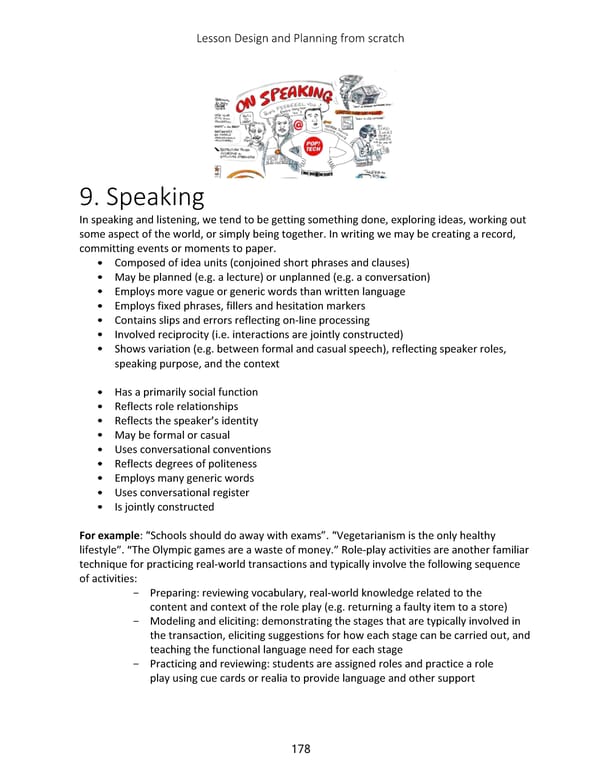Lesson Design and Planning from scratch 9. Speaking In speaking and listening, we tend to be getting something done, exploring ideas, working out some aspect of the world, or simply being together. In writing we may be creating a record, committing events or moments to paper. Composed of idea units (conjoined short phrases and clauses) ➙ ➙ May be planned (e.g. a lecture) or unplanned (e.g. a conversation) ➙ Employs more vague or generic words than written language Employs fixed phrases, fillers and hesitation markers ➙ Contains slips and errors reflecting on-line processing ➙ ➙ Involved reciprocity (i.e. interactions are jointly constructed) ➙ Shows variation (e.g. between formal and casual speech), reflecting speaker roles, speaking purpose, and the context Has a primarily social function ➙ Reflects role relationships ➙ ➙ Reflects the speaker s identity ➙ ➛ May be formal or casual Uses conversational conventions ➙ ➙ Reflects degrees of politeness ➙ Employs many generic words Uses conversational register ➙ ➙ Is jointly constructed For example: Schools should do away with exams . Vegetarianism is the only healthy ➜ ➝ ➜ lifestyle . The Olympic games are a waste of money. Role-play activities are another familiar ➝ ➜ ➝ technique for practicing real-world transactions and typically involve the following sequence of activities: - Preparing: reviewing vocabulary, real-world knowledge related to the content and context of the role play (e.g. returning a faulty item to a store) - Modeling and eliciting: demonstrating the stages that are typically involved in the transaction, eliciting suggestions for how each stage can be carried out, and teaching the functional language need for each stage - Practicing and reviewing: students are assigned roles and practice a role play using cue cards or realia to provide language and other support 178
 Try before buy. Lesson Design and Planning from scratch.: A self-study reference and practice book. Page 31 Page 33
Try before buy. Lesson Design and Planning from scratch.: A self-study reference and practice book. Page 31 Page 33